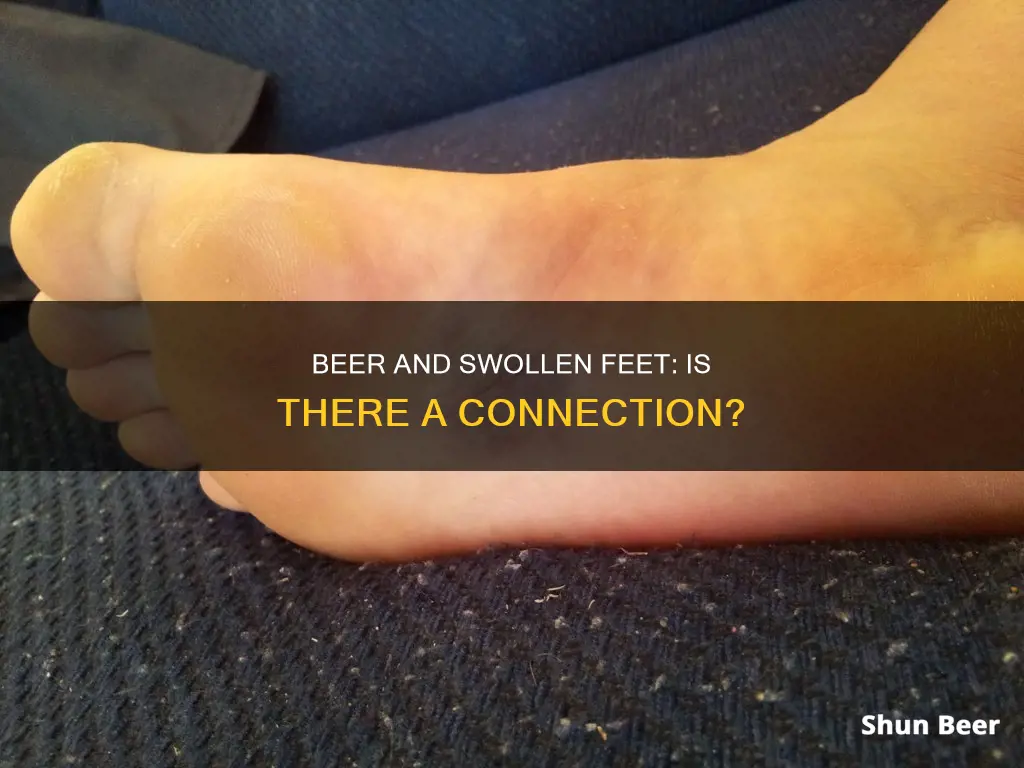
Drinking beer and other alcoholic beverages can cause your feet to swell. This is due to a condition called edema, which is caused by water retention in the body. Alcohol affects the antidiuretic hormone (ADH) in the body, which leads to increased urination and dehydration. As the body tries to rebalance its fluids, it may start to retain too much water, leading to edema and swollen feet. While mild edema is not usually a cause for concern, frequent or prolonged swelling could indicate a more serious issue such as liver, heart, or kidney problems.
| Characteristics | Values |
|---|---|
| Swelling caused by | Excessive fluid collection in the tissues of the feet |
| Medical term | Edema |
| Other affected areas | Ankles, hands, legs, abdomen, face |
| Cause | Alcohol blocks the release of antidiuretic hormone (ADH) |
| Treatment | Edema caused by drinking beer usually goes away in a day or two |
| Prevention | Drink in moderation, avoid salty food, drink water between drinks, elevate legs, wear compression socks |
| When to see a doctor | If swelling occurs frequently and lasts for several days |
| Possible underlying issues | Heart, liver, or kidney problems |
What You'll Learn
- Alcohol causes water retention, leading to swollen feet
- Edema is the medical term for swelling caused by water retention
- Alcohol affects the antidiuretic hormone, causing dehydration and water retention
- Prolonged swelling may indicate heart, liver, or kidney issues
- Reducing alcohol intake and staying hydrated can help prevent swelling

Alcohol causes water retention, leading to swollen feet
Alcohol can cause water retention, leading to swollen feet and a condition known as edema. Edema occurs when there is an excessive collection of fluid in the tissues of the ankles and feet, causing swelling and puffiness. While this can affect various body parts, it is most common in the legs, ankles, and feet.
Drinking alcohol can disrupt the release of the antidiuretic hormone (ADH) or vasopressin, which normally signals the kidneys to conserve fluids. With reduced ADH levels, the body loses water, leading to frequent urination. However, when alcohol consumption stops, ADH levels rebound, causing the kidneys to retain water again. This rebound effect, combined with alcohol's dehydrating properties, can result in water retention and edema.
Additionally, alcohol alters how the kidneys handle electrolytes like potassium and sodium. As a result, the total body water temporarily increases, contributing to edema and swollen feet. This swelling typically resolves within a day or two but can be a sign of frequent alcohol consumption or an underlying health issue.
If you experience recurrent or prolonged swelling in your feet after drinking, it may indicate a problem with your heart, liver, or kidneys. In such cases, it is advisable to consult a doctor and reduce alcohol consumption.
Beer and Keppra: Is It Safe to Drink?
You may want to see also

Edema is the medical term for swelling caused by water retention
Edema is the medical term for swelling caused by fluid retention in the body's tissues. This can happen in the feet, ankles, legs, hands, face, and abdomen. It is characterised by an increase in size of body parts, which may cause difficulty in completing daily tasks. The skin over the swollen area may look stretched and shiny, and there may be mild pain or soreness.
Edema is caused by a buildup of fluid in the tissues. This can be the result of several factors, including gravity, weakened vein valves, underlying medical conditions, medication side effects, poor nutrition, pregnancy, and a compromised immune system. Alcohol consumption is also a known cause of edema, as it affects the kidneys' filtering abilities and their handling of electrolytes like potassium and sodium. This leads to an increase in water retention in the body, resulting in edema.
The condition can be treated through lifestyle changes, such as elevating the affected body parts, wearing compression garments, reducing salt intake, and increasing physical activity. In some cases, medication may be prescribed to treat the underlying cause of the edema.
While mild cases of edema usually resolve within a few days, it is important to monitor the condition and seek medical advice if the swelling persists or is accompanied by other symptoms. Edema can be a symptom of more serious health issues, including pulmonary edema, liver damage, or heart problems.
Beer and Breastfeeding: What's Safe?
You may want to see also

Alcohol affects the antidiuretic hormone, causing dehydration and water retention
The antidiuretic hormone (ADH), or vasopressin, is produced by the hypothalamus and communicates with your kidneys, regulating the water content in your blood. When you consume alcohol, it suppresses the release of ADH. The reduced ADH level, coupled with direct effects on the kidneys, leads to excessive water loss, resulting in frequent urination.
As your body strives to restore balance, it may overcompensate and start retaining too much fluid. This rebound effect, combined with dehydration, can lead to increased sodium levels in your body, contributing to water retention and edema. Edema is characterised by excessive fluid accumulation in the tissues of your ankles, feet, and other parts of your body.
While mild edema usually resolves within a day or two, chronic and heavy drinkers may experience prolonged swelling. This extended period of swelling could indicate underlying issues with the heart, liver, or kidneys. If you experience frequent and persistent swelling, it is advisable to consult a doctor.
To mitigate the effects of edema, it is recommended to drink alcohol in moderation, avoid excessive salty food, stay hydrated by drinking water between alcoholic beverages, and elevate your legs or wear compression socks if your ankles and feet are affected.
Drinking and Driving: Two Beers, Am I Safe?
You may want to see also

Prolonged swelling may indicate heart, liver, or kidney issues
While temporary swelling of the feet after drinking beer is not uncommon, prolonged swelling could be indicative of more serious health issues.
If you notice that your feet remain swollen for an extended period after consuming beer, it may be a sign of impaired kidney function. The kidneys play a crucial role in maintaining fluid balance in the body. When they are not functioning optimally, they may struggle to remove excess fluid, leading to a condition called edema, characterised by swelling in various parts of the body, including the ankles and feet.
In addition to swelling, kidney disease may present with other symptoms such as shortness of breath, chest pain, and stiffness. It is important to monitor your blood pressure and weight daily, as sudden changes in these can also indicate excess fluid in the body. If you suspect that your kidneys may be impaired, it is essential to consult a healthcare professional for further evaluation and guidance.
Prolonged swelling could also be indicative of liver issues. Alcoholic liver disease, caused by excessive alcohol consumption, can lead to liver inflammation and swelling. This, in turn, can cause fluid retention, resulting in swelling in the legs and abdomen. Liver swelling is often associated with other symptoms, including abdominal discomfort, a feeling of fullness, jaundice, fatigue, and weight loss. If liver disease is left untreated, it can progress to cirrhosis, where healthy liver tissue is replaced by scar tissue, leading to impaired liver function and severe complications.
Furthermore, heart issues could be a cause of prolonged swelling. Heart disease can cause a backup of blood in the veins of the legs, resulting in fluid buildup and swelling in the lower limbs. Other warning signs of heart issues include chest pain, shortness of breath, and fatigue.
If you experience prolonged swelling in your feet, it is important to consult a healthcare professional to determine the underlying cause and receive appropriate treatment.
STD Shots and Beer: What's Safe?
You may want to see also

Reducing alcohol intake and staying hydrated can help prevent swelling
Drinking alcohol can have several adverse effects on the body, and one of the most common side effects is swelling of the feet. This condition, known as edema, occurs due to excessive fluid retention in the tissues of the ankles and feet. While mild cases of edema typically resolve within a day or two, frequent and prolonged swelling could indicate underlying health issues.
Reducing alcohol intake and staying hydrated are effective strategies to prevent and manage edema. Alcohol consumption can lead to dehydration, which disrupts the body's fluid balance and contributes to fluid retention and swelling. By limiting alcohol intake, individuals can reduce the risk of edema and its associated discomfort.
Additionally, staying hydrated is crucial in managing edema. Drinking water between alcoholic beverages can help counter the dehydrating effects of alcohol and reduce the severity of edema. It is important to listen to your body and respond to thirst cues, ensuring adequate hydration throughout the day.
In addition to hydration, dietary choices play a role in edema management. Consuming high-sodium foods can exacerbate swelling, as sodium contributes to fluid retention. Therefore, choosing a healthy, low-sodium diet can help alleviate edema symptoms. Including hydrating foods rich in potassium can also aid in restoring electrolyte balance, further reducing the risk of swelling.
While mild edema may not be a significant concern, frequent and prolonged swelling could indicate more serious health issues, including liver, heart, or kidney problems. If edema persists or occurs regularly, it is important to consult a healthcare professional for further evaluation and guidance.
Beer Consumption and Liver Enzyme Elevation: Is There a Link?
You may want to see also
Frequently asked questions
Drinking beer or any alcoholic beverage can lead to swollen feet as alcohol causes the body to retain excess water. This is due to the effect alcohol has on the antidiuretic hormone (ADH) or vasopressin, which regulates the water content in your blood.
Mild bloating or fluid retention usually resolves on its own within a day or two. If the swelling lasts for more than two days, it may be a sign of an underlying issue and you should consult a doctor.
To reduce swelling, it is recommended to stop drinking alcohol, soak your feet in cold water, and elevate the affected area.
Recurrent swelling of the feet after drinking alcohol could indicate problems with the heart, liver, or kidneys. It may also be a sign that you are consuming too much alcohol.







